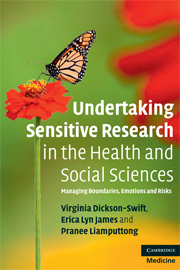 Undertaking Sensitive Research in the Health and Social Sciences
Undertaking Sensitive Research in the Health and Social Sciences Book contents
- Frontmatter
- Contents
- Preface
- Acknowledgements
- About the authors
- 1 What is sensitive research?
- 2 Doing sensitive research: methodological, theoretical, ethical and moral perspectives
- 3 Conducting a sensitive research project
- 4 Managing boundaries in sensitive research
- 5 Emotions and sensitive research
- 6 Managing risks and ethics in research
- 7 Implications and recommendations for researchers
- References
- Index
- References
7 - Implications and recommendations for researchers
Published online by Cambridge University Press: 11 September 2009
- Frontmatter
- Contents
- Preface
- Acknowledgements
- About the authors
- 1 What is sensitive research?
- 2 Doing sensitive research: methodological, theoretical, ethical and moral perspectives
- 3 Conducting a sensitive research project
- 4 Managing boundaries in sensitive research
- 5 Emotions and sensitive research
- 6 Managing risks and ethics in research
- 7 Implications and recommendations for researchers
- References
- Index
- References
Summary
In taking better care of the researchers, we might enhance the quality of the whole process, for the benefit of researched, researchers and the learning community alike.
(Etherington, 1996:346)So, by this stage of the book readers may well be feeling like conducting research on a sensitive topic is fraught with problems and challenges and you might be rethinking your proposal! Do not despair. In this chapter we provide a number of practical recommendations to help reduce both the chance of negative outcomes and the impact they may have on you as a researcher. The aim of the earlier chapters was not to be alarmist, but instead to raise awareness of potential risks so as to minimize exposure of future researchers.
The factors that contribute to the risks described throughout this book are complex, and as such the solutions we suggest are multilevel and span responsibility from the individual researcher, the supervisor, the research institution and extend as far as granting bodies who fund research. Therefore, the recommendations we make are tailored for specific groups in the research process. While few readers are likely to be in a position to influence the activities and policies of their institution and national funding bodies, most of us do have the potential, and some would argue the responsibility, to try and influence our own research groups and our own individual behaviour.
- Type
- Chapter
- Information
- Undertaking Sensitive Research in the Health and Social SciencesManaging Boundaries, Emotions and Risks, pp. 115 - 126Publisher: Cambridge University PressPrint publication year: 2008


